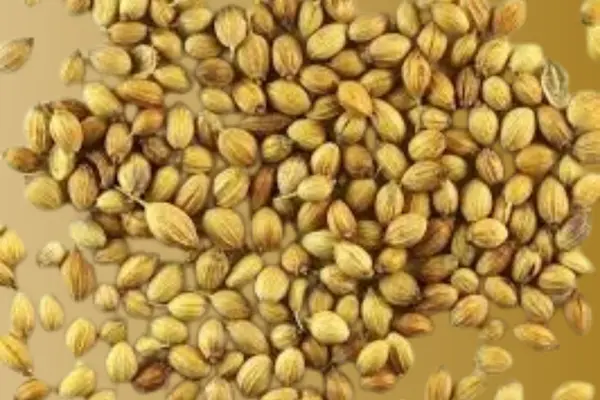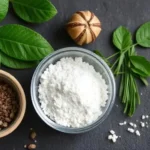Koriandri, or coriander as it is more generally known in English, is a herb that is not limited by time or place. This plant has a long history that stretches back to ancient civilizations. It is known by many different names around the world, including koriandri in several European and South Asian dialects, cilantro in Spanish, and dhania in Hindi. A true gem of nature, koriandri is used as a spice in food preparation, a medicinal herb, and even for aromatherapy.
Overview and Origins of Botany
Koriandri, scientifically known as Coriandrum sativum, is a member of the Apiaceae family. Originating in Southern Europe, Northern Africa, and Southwest Asia, koriandri has made its way into kitchens and gardens all around the world. With delicate, lacy leaves and globe-shaped seeds that are gathered and dried, the plant can reach a height of 50 cm.
Nutritional Composition of Koriandri
The power of koriandri lies in its rich nutritional profile. Just a few grams of this herb can provide a concentrated dose of:
- Vitamin C
- Vitamin K
- Folate
- Calcium
- Magnesium
- Iron
- Potassium
- Essential oils (linalool, geraniol, borneol)
These components make koriandri an ideal supplement for maintaining overall health, boosting immunity, and enhancing metabolism.
Culturally Diverse Culinary Uses
Asian Food
Koriandri is used in Thai, Chinese, Indian, and Pakistani cooking in a variety of ways, including whole seeds, powdered powder, and fresh leaves (cilantro). It enhances the taste of marinades, chutneys, lentil soups, and curries.
Mediterranean and Middle Eastern Foods
Koriandri is used in stews, falafel, hummus, and meat rubs in Middle Eastern cooking. To bring out the nutty flavor of its seeds, they are frequently dry-roasted.
Caribbean and Latin American Cuisine
Here, taco toppings, ceviche, guacamole, and salsas all require fresh coriander, or cilantro. It counterbalances the spiciness with a lively, lemony aroma.
Benefits of Koriandri for Health
1. Enhances Gut Health and Digestion
By stimulating digestive enzymes, koriandri promotes easier digestion. It works very well to lessen gas, bloating, and constipation. Its antimicrobial qualities also support the equilibrium of intestinal flora.
2. Controls the Level of Blood Sugar
According to a number of studies, korian dri may lessen blood sugar rises by encouraging the synthesis of insulin. For those who have type 2 diabetes or are at risk, this makes it a beneficial addition to their diets.
3. Promotes Heart Health
Korian dri, which is high in antioxidants and potassium, helps raise HDL and decrease LDL, or bad cholesterol. Additionally, it naturally lowers blood pressure.
4. Heavy Metal Removal and Detoxification
A vital component of natural detox treatments, korian dri is believed to help the body get rid of harmful heavy metals like lead, mercury, and aluminum.
5. Pain and Inflammation Reduction
Korian dri has potent anti-inflammatory qualities because of its high cineole and linoleic acid concentration. It lessens the pain and swelling brought on by inflammatory diseases like arthritis and muscle stiffness.
- Improves the Health of the Skin
Korian dri is excellent against eczema, acne, and fungal infections because of its natural antibacterial and antifungal ingredients. In order to attain clear, glowing skin, it is also utilized in masks and toners.
7. Increases Immunity
Korian dri is a natural immune-boosting herb since it contains high amounts of vitamins A and C as well as other minerals. The body is protected from common pathogens by its antibacterial qualities.
Essential Oil of Koriandri: Aromatherapy and Other Uses
Aromatherapy makes extensive use of coriander seed oil, which is derived from the seeds. It is a natural aphrodisiac that also has a relaxing effect, reduces tension, and enhances mental clarity. It’s also utilized in diffusers, massage oils, and even DIY deodorants.
Ayurvedic and Conventional Uses
Korian dri is categorized as a cooling herb that balances Pitta dosha in Ayurveda. It is frequently used in teas and decoctions to treat hormonal imbalances, fevers, and UTIs.
Korian dri is used in Unani and Traditional Chinese Medicine to control Qi, the essential energy of the body. For digestion and detoxifying, it is frequently used with other herbs.
Growing Koriandri at Home
Growing korian dri at home is simple and rewarding. Here’s what you need:
- Well-drained soil
- Plenty of sunlight
- Moderate watering
- Space for roots to expand
From seed to harvest, the cycle takes about 45–60 days. You can harvest the leaves when the plant is 4–6 inches tall and later collect the seeds for further use.
Koriandri in Modern Pharmaceuticals and Supplements
Owing to its therapeutic properties, korian dri is being actively researched for use in:
- Herbal supplements
- Cholesterol-lowering capsules
- Blood sugar control formulas
- Natural skincare products
Extracts and oils are also being used in pharmaceutical formulations for digestive and antimicrobial treatments.
How to Incorporate Koriandri into Your Diet
You can enjoy korian dri in various ways:
- Sprinkle fresh leaves on soups, salads, or rice
- Add ground seeds to spice blends and baking recipes
- Infuse water with crushed seeds for a detox drink
- Brew coriander tea for digestive relief
Safety and Side Effects
Korian dri is generally safe for most people. However:
- Large doses may lead to allergic reactions in sensitive individuals
- May interact with blood-thinning medications
- Avoid during pregnancy in high medicinal doses without doctor consultation
Always consult a healthcare provider before starting any herbal regimen.
Conclusion
More than just a spice for the cooking, korian dri is a health powerhouse, an essential component of long-standing customs, and a rising star in the fields of nutrition and wellness. Whether you want to improve the taste of your meal, strengthen your immune system, or cleanse your body, korian dri is a natural cure that has been used for a very long time.















Leave a comment